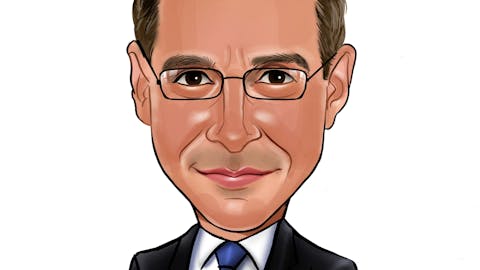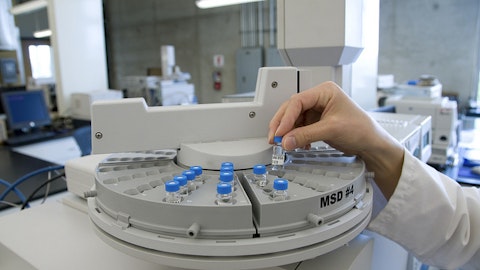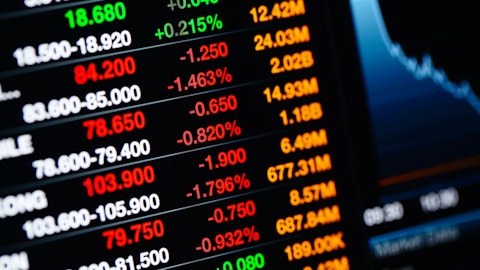Palo Alto Investors, founded by Wall Street veteran William Leland Edwards in 1989, is one of the biggest healthcare investment shops in the United States, with over $2 billion in assets under management. The California-based investment firm mainly invests in micro-cap and small-cap equities, as these stocks are not as closely scrutinized by sell-side research firms. Palo Alto Investors reckons that the healthcare sector is misunderstood and undervalued by the market, and has great potential for appreciation in the future. This statement justifies the 98% exposure to the healthcare sector that its U.S-focused equity portfolio has. It appears that the turbulent third quarter propelled Palo Alto to lift its exposure to the healthcare sector and U.S equities in general, as the healthcare-focused firm initiated four new positions and added to 17 existing ones, while selling out of only two positions and reducing its holdings in seven stocks during the three-month period. Without further ado, let’s lay out the list of top stock picks owned by William Edwards’ investment firm at the end of the third quarter.
Most investors don’t understand hedge funds and indicators that are based on hedge funds’ activities. They ignore hedge funds because of their recent poor performance in the bull market. Our research indicates that hedge funds underperformed because they aren’t 100% long. Hedge fund fees are also very large compared to the returns generated and they reduce the net returns experienced by investors. We uncovered that hedge funds’ long positions actually outperformed the market. For instance the 15 most popular small-cap stocks among funds beat the S&P 500 Index by more than 53 percentage points since the end of August 2012. These stocks returned a cumulative of 102% vs. a 48.7% gain for the S&P 500 Index (read the details). That’s why we believe investors should pay attention to what hedge funds are buying (rather than what their net returns are).
Follow Joon Yun And Patrick Lee's Palo Alto Investors
#5 BioMarin Pharmaceutical Inc. (NASDAQ:BMRN)
-Shares Owned by Palo Alto Investors (as of September 30): 1.67 Million
-Value of Holding (as of September 30): $175.52 Million
Palo Alto Investors raised its position in BioMarin Pharmaceutical Inc. (NASDAQ:BMRN) by a mere 6,400 shares during the third quarter, with the position accounting for 8.44% of the fund’s equity portfolio as of September 30. The company develops innovative biopharmaceuticals for the treatment of serious diseases and medical conditions, and currently has five approved products and several clinical and pre-clinical product candidates. Earlier this year, the company announced the acceptance of a New Drug Application (NDA) for Kyndrisa, which is designed to treat a fatal disease called Duchenne Muscular Dystrophy. However, a recent FDA advisory panel diminished the odds that the FDA will approve the drug, mainly owing to worries about the drug’s safety. Meanwhile, the stock is up by 7% for the year. Baker Bros. Advisors, founded by Julian Baker and Felix Baker, reported owning 4.08 million shares of BioMarin Pharmaceutical Inc. (NASDAQ:BMRN) via the latest round of 13Fs.
#4 United Therapeutics Corporation (NASDAQ:UTHR)
-Shares Owned by Palo Alto Investors (as of September 30): 1.52 Million
-Value of Holding (as of September 30): $200.04 Million
The California-based investment firm upped its stake in United Therapeutics Corporation (NASDAQ:UTHR) by 84,326 shares during the turbulent third quarter. The biotechnology company focuses on the development of products for the treatment of chronic cardiovascular and infectious diseases and cancer, and has seen its shares advance by 17% in the fourth quarter. The company’s portfolio of five commercial products generated revenue of $386.22 million for the third quarter, which was up by $56.3 million quarter-over-quarter. Its net income came to $9.24 per share, compared with a net loss of $0.53 per share a year earlier. Cliff Asness’ AQR Capital Management owns 1.30 million shares of United Therapeutics Corporation (NASDAQ:UTHR) as of September 30.
Follow United Therapeutics Corp (NASDAQ:UTHR)
Follow United Therapeutics Corp (NASDAQ:UTHR)
Receive real-time insider trading and news alerts





